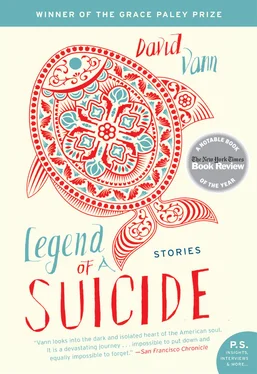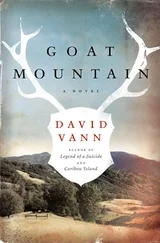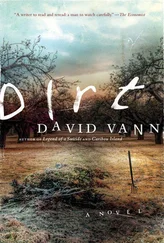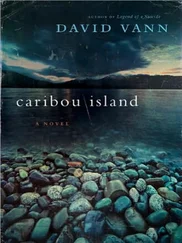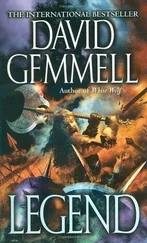David Vann - Legend of a Suicide
Здесь есть возможность читать онлайн «David Vann - Legend of a Suicide» весь текст электронной книги совершенно бесплатно (целиком полную версию без сокращений). В некоторых случаях можно слушать аудио, скачать через торрент в формате fb2 и присутствует краткое содержание. Год выпуска: 2009, Издательство: Penguin Books Ltd, Жанр: Современная проза, на английском языке. Описание произведения, (предисловие) а так же отзывы посетителей доступны на портале библиотеки ЛибКат.
- Название:Legend of a Suicide
- Автор:
- Издательство:Penguin Books Ltd
- Жанр:
- Год:2009
- ISBN:нет данных
- Рейтинг книги:3 / 5. Голосов: 1
-
Избранное:Добавить в избранное
- Отзывы:
-
Ваша оценка:
- 60
- 1
- 2
- 3
- 4
- 5
Legend of a Suicide: краткое содержание, описание и аннотация
Предлагаем к чтению аннотацию, описание, краткое содержание или предисловие (зависит от того, что написал сам автор книги «Legend of a Suicide»). Если вы не нашли необходимую информацию о книге — напишите в комментариях, мы постараемся отыскать её.
follows Roy Fenn from his birth on an island at the edge of the Bering Sea to his return thirty years later to confront the turbulent emotions and complex legacy of his father's suicide.
Legend of a Suicide — читать онлайн бесплатно полную книгу (весь текст) целиком
Ниже представлен текст книги, разбитый по страницам. Система сохранения места последней прочитанной страницы, позволяет с удобством читать онлайн бесплатно книгу «Legend of a Suicide», без необходимости каждый раз заново искать на чём Вы остановились. Поставьте закладку, и сможете в любой момент перейти на страницу, на которой закончили чтение.
Интервал:
Закладка:
THE HIGHER BLUE
IN THE VERY end — always a surprising time — my father fixated on zabaglione. This is all hearsay, you understand, but I like to think that when my father purchased his first copper pot, when he stood in his dental smock in a tiny kitchenware store in the only mall of a nearly abandoned Alaskan town and vaulted startlingly into his new life, I was at his elbow selecting a whisk.
My father’s house had no furniture. It was brand new, and everything was still bare, no address even. A faint hill near the top of a ridge, paper birch spaced regular as candles, darkness at 4:00 p.m., March 15, 1980, aurora borealis in pleasing shades of green unnoticed, a boy and his father in parkas, a flashlight, copper bowl, whisk, last-minute sugar, and though the mind refuses it, a sense of home. All of this carries the boy and his father, the father and his boy, into the kitchen, where the air is not quite right for zabaglione, too dry perhaps, so the father closes tight the windows and doors, leaves water in the sink, isolates the kitchen from the rest of the house while the boy shoves dish towels in all the cracks for a tight seal.
“I need an apron,” the father says. But there is no apron, he knows. This is a new house. Until the boy arrived, there was no one. If curtains existed, he would take one down from the window above the sink and use that.
“Okay,” the father says, tying his winter parka around his middle. “This’ll have to do. Let’s put everything out on the counter.”
Three new cookbooks, three eggs, plastic yolk separator, tablespoon, five-pound bag of sugar, measuring cup, marsala wine, two bowls, two sherry glasses, two spoons, whisk, and a copper pot. I like to think the boy is helpful, that the items are neatly arranged. The father doesn’t have a double boiler, but he does have a metal gravy bowl, and this, filled with water, he places on the burner. “Hmm,” he says when he turns on the gas and the self-starter clicks away but there’s no flame.
“‘Pure zabaione would be overly rich to eat by itself,’” the boy reads aloud to his father. “But that’s what we’re making, right?”
“Where’d you read that?” the father asks and takes the book from his boy. He reads, his opaque brow etched. The window is dark, and the only sound is the clicking. The boy hasn’t had dinner yet and senses himself about to complain. The more he thinks about this, the more hollow his stomach.
“This isn’t the one I read before,” the father says. “Or at least not all of it. The author — Giuliano Bugialli — ha, what a name — keeps talking about a wooden spoon, and I don’t even have a wooden spoon. ‘Just at the moment before boiling,’ the guy says here, ‘zabaione’—and he’s spelling it different, too—‘zabaione should be thick enough to stick to the wooden spoon. That is the moment it is ready.’” The father returns the book to his boy. In a faked Italian accent, one arm waving in the air, he repeats, “‘That is the moment it is ready.’” The boy grins.
The father opens another recipe book. “Here we go,” he says, “Simple—‘whip vigorously with a wire whisk until the custard foams up.’”
“Let’s use that one,” the boy says, agreeable to the last.
“Okay,” his father says, fulfilling dreams.
The stove is clicking away but still no flame. The father moves his metal gravy bowl to the counter and lifts off the top of the stove to get a closer look. “Brand new,” he says, and tries another burner. Still only clicking and a faint hiss. “Why don’t you crack the eggs and separate the yolks while I’m fixing the stove,” he says.
“Okay,” the boy says, agreeable to the bitter end. But when he looks at the recipe, he sees that it calls for six egg yolks. They have only three eggs. The other recipe called for only three eggs. The boy grapples with his fear of annihilation. Does he dare point out another flaw? Won’t it start to look like his own fault? The boy cracks the three eggs and separates the whites into one bowl, the yolks into another.
The father closes the oven door. “No clue in there,” he says. “I don’t know how the hell this thing works.” He grins at his boy.
“We could try using a match,” the boy suggests.
“A match!” the father yells triumphantly. “That’s my boy.” And lo and behold, one of the kitchen drawers by the sink does, in fact, contain a box of matches. The boy is emboldened; perhaps this is a flaw in his own character. But forgetting the consequences for a moment, he points out to his father the thing about the six eggs.
“Six?” the father asks. Annihilation comes rushing in. The boy backs up against the sink as his father reads extensively in all three books. The boy isn’t hungry anymore. He’s lost his appetite and he’s a little dizzy. If his father is intent on killing himself, the boy doesn’t want a part in it anymore. He opens the cabinet beneath the sink and crawls in.
“Oh, hell,” the father says. “We’re just gonna have to try it with three.” The boy hears the metal gravy bowl placed on the burner, the water sloshing a little, the thin sides ringing — a kind of water gong, almost, a low shimmer. Then the scrape of a match, an explosion, the air sucked from the boy’s lungs, and the boy imagines one tiny glimpse of a burning parka, of a father whirling fiery through the air.
The boy survives, of course, because he’s thousands of miles away. The father isn’t so lucky. Red lights, the trees quiet. But I should start closer to the truth.
The bachelor, prefiguring my existence, was living on his own, measuring out his life by soup can and frozen waffle carton. Were it not for the persistence of habit and a metal gravy bowl never washed but used over and over, kept warm on the stove, life as I know it might never have begun.
Hunched and dim-sighted, bent over tomes of anatomy, periodontics, endodontics, and the other dental sciences, clenching a jaw that was understood but underused, locked in realms of fluorescence and linoleum, dreaming only of sunny wilderness, of rod and gun and the clomping of trail-worn boots, this creature inspired pity in a woman who herself had no domestic talents but had the sense, at least, to eat out occasionally.
“I bought him one dinner at a Chinese restaurant, served him one cup of coffee and a bowl of mint-chip ice cream at my apartment, and he was mine,” my mother told me.
The creature began to walk upright, lose his pallor, see occasionally the light of day, sample rich foods from many lands, and dream of things softer and more varied than his own leathery boots. The creature was given a name. He was called Honey.
“The first two years were good. Then he took me for granted. I gave him a life, and he was so pleased, he started giving it to others. To a receptionist named Gloria, to be exact.”
The thing called Honey, which had learned to walk, see, sample, and dream, walked farther, saw more, sampled extravagantly, then dreamed about it, over and over. The thing was told to stop walking, but the thing kept walking. The thing became inflated and soared over the city, lighter than air.
“I gave him a can opener the day I divorced him,” my mother said. “He didn’t know what it was for. I told him he’d find out soon enough.”
The thing popped, landed like minestrone, a fall more terrible than the face-plant of Icarus. Out of the goop grew a hand that could turn, and turn, and turn, and turn, and turn.
In later years, I tried to know the father. I called him Dad, brought groceries to his house, and, despite my native inhibitions, learned to cook spaghetti. In hopes of drawing some response, I even asked pointed questions about his life.
“When did you first realize you had made a mistake?” I asked.
Читать дальшеИнтервал:
Закладка:
Похожие книги на «Legend of a Suicide»
Представляем Вашему вниманию похожие книги на «Legend of a Suicide» списком для выбора. Мы отобрали схожую по названию и смыслу литературу в надежде предоставить читателям больше вариантов отыскать новые, интересные, ещё непрочитанные произведения.
Обсуждение, отзывы о книге «Legend of a Suicide» и просто собственные мнения читателей. Оставьте ваши комментарии, напишите, что Вы думаете о произведении, его смысле или главных героях. Укажите что конкретно понравилось, а что нет, и почему Вы так считаете.
